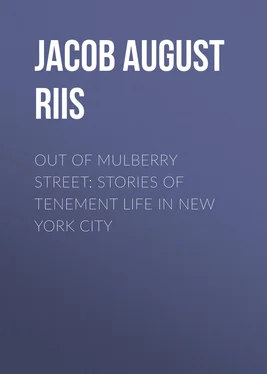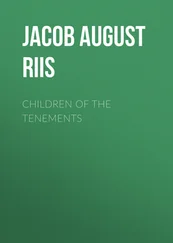Jacob August Riis - Out of Mulberry Street - Stories of Tenement life in New York City
Здесь есть возможность читать онлайн «Jacob August Riis - Out of Mulberry Street - Stories of Tenement life in New York City» — ознакомительный отрывок электронной книги совершенно бесплатно, а после прочтения отрывка купить полную версию. В некоторых случаях можно слушать аудио, скачать через торрент в формате fb2 и присутствует краткое содержание. Жанр: foreign_prose, foreign_antique, на английском языке. Описание произведения, (предисловие) а так же отзывы посетителей доступны на портале библиотеки ЛибКат.
- Название:Out of Mulberry Street: Stories of Tenement life in New York City
- Автор:
- Жанр:
- Год:неизвестен
- ISBN:нет данных
- Рейтинг книги:5 / 5. Голосов: 1
-
Избранное:Добавить в избранное
- Отзывы:
-
Ваша оценка:
- 100
- 1
- 2
- 3
- 4
- 5
Out of Mulberry Street: Stories of Tenement life in New York City: краткое содержание, описание и аннотация
Предлагаем к чтению аннотацию, описание, краткое содержание или предисловие (зависит от того, что написал сам автор книги «Out of Mulberry Street: Stories of Tenement life in New York City»). Если вы не нашли необходимую информацию о книге — напишите в комментариях, мы постараемся отыскать её.
Out of Mulberry Street: Stories of Tenement life in New York City — читать онлайн ознакомительный отрывок
Ниже представлен текст книги, разбитый по страницам. Система сохранения места последней прочитанной страницы, позволяет с удобством читать онлайн бесплатно книгу «Out of Mulberry Street: Stories of Tenement life in New York City», без необходимости каждый раз заново искать на чём Вы остановились. Поставьте закладку, и сможете в любой момент перейти на страницу, на которой закончили чтение.
Интервал:
Закладка:
Suddenly she stumbled. Joe pulled her up in time, and throwing the reins over her back, got down to see what it was. An old horseshoe, and in the dust beside it a new silver quarter. He picked both up and put the shoe in the wagon.
“They say it is luck,” he mused, “finding horse-iron and money. Maybe it’s my Christmas. Get up, ’Liza!” And he drove off to the ferry.
The glare of a thousand gas-lamps had chased the sunset out of the western sky, when Joe drove home through the city’s streets. Between their straight mile-long rows surged the busy life of the coming holiday. In front of every grocery-store was a grove of fragrant Christmas trees waiting to be fitted into little green stands with fairy fences. Within, customers were bargaining, chatting, and bantering the busy clerks. Peddlers offering tinsel and colored candles waylaid them on the door-step. The rack under the butcher’s awning fairly groaned with its weight of plucked geese, of turkeys, stout and skinny, of poultry of every kind. The saloon-keeper even had wreathed his door-posts in ground-ivy and hemlock, and hung a sprig of holly in the window, as if with a spurious promise of peace on earth and good-will toward men who entered there. It tempted not Joe. He drove past it to the corner, where he turned up a street darker and lonelier than the rest, toward a stretch of rocky, vacant lots fenced in by an old stone wall. ’Liza turned in at the rude gate without being told, and pulled up at the house.
A plain little one-story frame with a lean-to for a kitchen, and an adjoining stable-shed, over-shadowed all by two great chestnuts of the days when there were country lanes where now are paved streets, and on Manhattan Island there was farm by farm. A light gleamed in the window looking toward the street. As ’Liza’s hoofs were heard on the drive, a young girl with a shawl over her head ran out from some shelter where she had been watching, and took the reins from Joe.
“You’re late,” she said, stroking the mare’s steaming flank. ’Liza reached around and rubbed her head against the girl’s shoulder, nibbling playfully at the fringe of her shawl.
“Yes; we’ve come far, and it’s been a hard pull. ’Liza is tired. Give her a good feed, and I’ll bed her down. How’s mother?”
“Sprier than she was,” replied the girl, bending over the shaft to unbuckle the horse; “seems as if she’d kinder cheered up for Christmas.” And she led ’Liza to the stable while her father backed the wagon into the shed.
It was warm and very comfortable in the little kitchen, where he joined the family after “washing up.” The fire burned brightly in the range, on which a good-sized roast sizzled cheerily in its pot, sending up clouds of savory steam. The sand on the white pine floor was swept in tongues, old-country fashion. Joe and his wife were both born across the sea, and liked to keep Christmas eve as they had kept it when they were children. Two little boys and a younger girl than the one who had met him at the gate received him with shouts of glee, and pulled him straight from the door to look at a hemlock branch stuck in the tub of sand in the corner. It was their Christmas tree, and they were to light it with candles, red and yellow and green, which mama got them at the grocer’s where the big Santa Claus stood on the shelf. They pranced about like so many little colts, and clung to Joe by turns, shouting all at once, each one anxious to tell the great news first and loudest.
Joe took them on his knee, all three, and when they had shouted until they had to stop for breath, he pulled from under his coat a paper bundle, at which the children’s eyes bulged. He undid the wrapping slowly.
“Who do you think has come home with me?” he said, and he held up before them the veritable Santa Claus himself, done in plaster and all snow-covered. He had bought it at the corner toy-store with his lucky quarter. “I met him on the road over on Long Island, where ’Liza and I was to-day, and I gave him a ride to town. They say it’s luck falling in with Santa Claus, partickler when there’s a horseshoe along. I put hisn up in the barn, in ’Liza’s stall. Maybe our luck will turn yet, eh! old woman?” And he put his arm around his wife, who was setting out the dinner with Jennie, and gave her a good hug, while the children danced off with their Santa Claus.
She was a comely little woman, and she tried hard to be cheerful. She gave him a brave look and a smile, but there were tears in her eyes, and Joe saw them, though he let on that he didn’t. He patted her tenderly on the back and smoothed his Jennie’s yellow braids, while he swallowed the lump in his throat and got it down and out of the way. He needed no doctor to tell him that Santa Claus would not come again and find her cooking their Christmas dinner, unless she mended soon and swiftly.
They ate their dinner together, and sat and talked until it was time to go to bed. Joe went out to make all snug about ’Liza for the night and to give her an extra feed. He stopped in the door, coming back, to shake the snow out of his clothes. It was coming on with bad weather and a northerly storm, he reported. The snow was falling thick already and drifting badly. He saw to the kitchen fire and put the children to bed. Long before the clock in the neighboring church-tower struck twelve, and its doors were opened for the throngs come to worship at the midnight mass, the lights in the cottage were out, and all within it fast asleep.
The murmur of the homeward-hurrying crowds had died out, and the last echoing shout of “Merry Christmas!” had been whirled away on the storm, now grown fierce with bitter cold, when a lonely wanderer came down the street. It was a boy, big and strong-limbed, and, judging from the manner in which he pushed his way through the gathering drifts, not unused to battle with the world, but evidently in hard luck. His jacket, white with the falling snow, was scant and worn nearly to rags, and there was that in his face which spoke of hunger and suffering silently endured. He stopped at the gate in the stone fence, and looked long and steadily at the cottage in the chestnuts. No life stirred within, and he walked through the gap with slow and hesitating step. Under the kitchen window he stood awhile, sheltered from the storm, as if undecided, then stepped to the horse-shed and rapped gently on the door.
“’Liza!” he called, “’Liza, old girl! It’s me—Jim!”
A low, delighted whinnying from the stall told the shivering boy that he was not forgotten there. The faithful beast was straining at her halter in a vain effort to get at her friend. Jim raised a bar that held the door closed by the aid of a lever within, of which he knew the trick, and went in. The horse made room for him in her stall, and laid her shaggy head against his cheek.
“Poor old ’Liza!” he said, patting her neck and smoothing her gray coat, “poor old girl! Jim has one friend that hasn’t gone back on him. I’ve come to keep Christmas with you, ’Liza! Had your supper, eh? You’re in luck. I haven’t; I wasn’t bid, ’Liza; but never mind. You shall feed for both of us. Here goes!” He dug into the oats-bin with the measure, and poured it full into ’Liza’s crib.
“Fill up, old girl! and good night to you.” With a departing pat he crept up the ladder to the loft above, and, scooping out a berth in the loose hay, snuggled down in it to sleep. Soon his regular breathing up there kept step with the steady munching of the horse in her stall. The two reunited friends were dreaming happy Christmas dreams.
The night wore into the small hours of Christmas morning. The fury of the storm was unabated. The old cottage shook under the fierce blasts, and the chestnuts waved their hoary branches wildly, beseechingly, above it, as if they wanted to warn those within of some threatened danger. But they slept and heard them not. From the kitchen chimney, after a blast more violent than any that had gone before, a red spark issued, was whirled upward and beaten against the shingle roof of the barn, swept clean of snow. Another followed it, and another. Still they slept in the cottage; the chestnuts moaned and brandished their arms in vain. The storm fanned one of the sparks into a flame. It flickered for a moment and then went out. So, at least, it seemed. But presently it reappeared, and with it a faint glow was reflected in the attic window over the door. Down in her stall ’Liza moved uneasily. Nobody responding, she plunged and reared, neighing loudly for help. The storm drowned her calls; her master slept, unheeding.
Читать дальшеИнтервал:
Закладка:
Похожие книги на «Out of Mulberry Street: Stories of Tenement life in New York City»
Представляем Вашему вниманию похожие книги на «Out of Mulberry Street: Stories of Tenement life in New York City» списком для выбора. Мы отобрали схожую по названию и смыслу литературу в надежде предоставить читателям больше вариантов отыскать новые, интересные, ещё непрочитанные произведения.
Обсуждение, отзывы о книге «Out of Mulberry Street: Stories of Tenement life in New York City» и просто собственные мнения читателей. Оставьте ваши комментарии, напишите, что Вы думаете о произведении, его смысле или главных героях. Укажите что конкретно понравилось, а что нет, и почему Вы так считаете.












